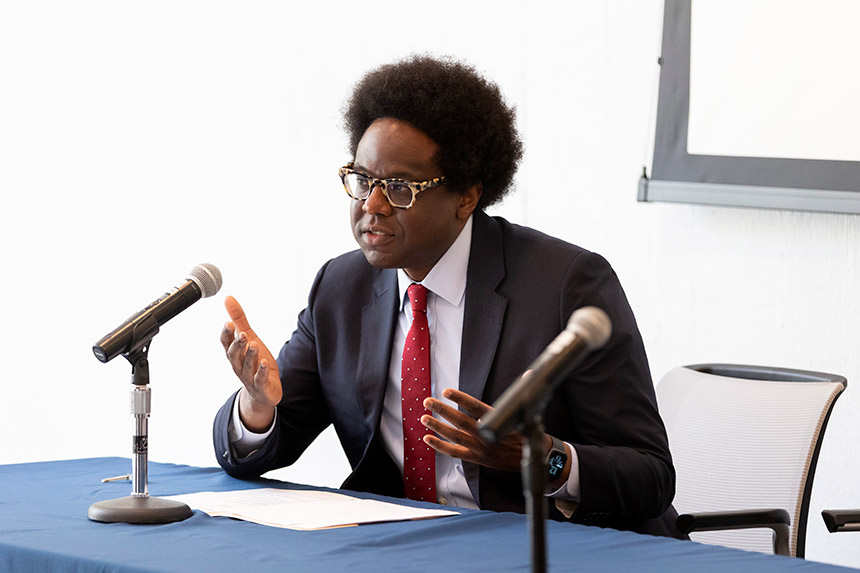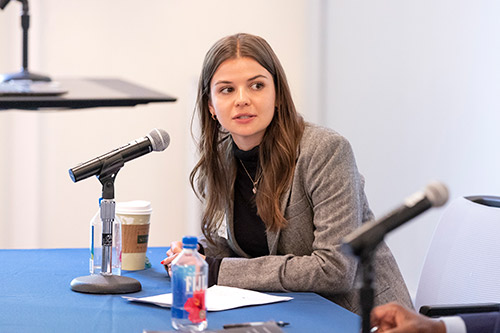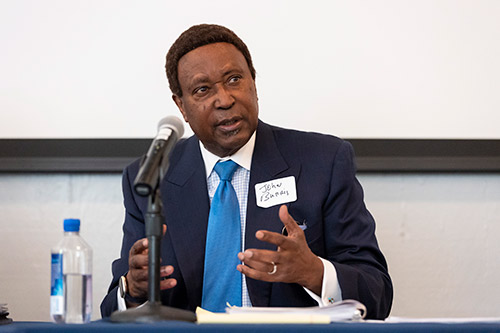
By Andrew Cohen
A recent Berkeley Law symposium confronted excessive use of police force, with renowned experts identifying obstacles to victims’ access to the courts and officer accountability, and exploring potential solutions.
“The law itself is a barrier to justice, and legal reform is needed to ensure that victims of police violence are heard in court and that officers are held accountable,” said Professor Osagie K. Obasogie, the event’s lead organizer. “Police violence is ultimately about the physical and psychological harm this can have on people and communities.”
Citing studies that show people of color are more likely to be stopped, searched, and arrested by police, Dean Erwin Chemerinsky said Black men between 15 and 34 are 4 times more likely than white men to be killed by police. He added that people of color make up less than 38% of America’s population but 63% of those killed by police.

Presented by Berkeley Law’s Civil Justice Research Initiative and the California Law Review and made possible with generous support from the American Association for Justice’s Robert L. Habush Endowment, the symposium addressed police department culture, institutional perceptions of ethnic minorities as threatening, scientifically suspect causes of death given by medical examiners, and close collaboration between police and other government agencies.
Los Angeles County District Attorney George Gascon said his office brought 11 charges for excessive force during his first two years on the job. By contrast, he said his predecessor brought one such charge in eight years and the DA before that none in 12 years.
“While this is a smaller percentage of the police’s overall work, it’s so poisonous to the entire process,” said Gascon, the former police chief of San Francisco and Mesa, Arizona. “Democracy depends on all of us believing that the government is here to work for you.”
He unpacked some cases that were dismissed at the preliminary hearing level, which carries a low threshold to move forward. In one, where Gascon said video evidence plainly showed the defendant getting knocked to the ground when an officer threw open his police car door, the police report said the defendant simply fell while running.
“The judge felt there wasn’t enough evidence to move the case forward even though the standard is simply a preponderance of the evidence,” Gascon said. “This is what we often see, judicial officers that prevent cases from being presented to the juries. Many prosecutors also often see themselves as police officers, and sometimes refuse to move forward in these cases.”
Fred Smith, a former Berkeley Law faculty member who currently teaches at Emory Law School, gave a keynote lecture that examined some of the challenges and limitations with using civil rights statutes to address police violence.
Medical misguidance
Panelists also discussed the growth of far-fetched reasons medical examiners use for the death of someone in police custody — rather than the actual use of force — arguing that such reasons aren’t supported by science and create a culture of impunity.
Decrying “a cottage industry of exoneration,” Harvard social epidemiologist Justin Feldman explained that U.S. death certificates do a poor job of counting killings by police and underreport them.
At the 2021 trial of Minneapolis police officer Derek Chauvin for the death of George Floyd, defense witness David Fowler, then Maryland’s former chief medical examiner, said the cause of death should be ruled undetermined — even though Floyd repeatedly said, “I can’t breathe” during the nine-plus minutes Chauvin’s knee was pressed on his neck. Fowler listed several possible explanations for Floyd’s death, including his high blood pressure and methamphetamine use, and even said carbon monoxide from the police car’s exhaust may have contributed.
Doctors widely blasted Fowler’s testimony and called for his past rulings to be investigated. The state of Maryland is currently reexamining 100 cases of deaths in police custody after an independent review of how 1,300 such cases were handled.
“You rarely see indictments of police for killings, let alone convictions,” Feldman said. “The underlying purpose is to eliminate culpability, shifting the blame from police onto the deceased person, often drawing on racist arguments that are the very cause of the interaction and police use of force in the first place.”
Obasogie, also a professor with UC Berkeley’s School of Public Health, has written extensively about “excited delirium” and other justifications given for the deaths of people in police custody. A current bill in the California State Assembly would ban excited delirium as an accepted cause of death.
“We have to think more about professional alignment between medicine and law,” Obasogie said. “How can we start raising questions about the duty medical professionals have to people in custody as opposed to people on the police force?”
Discussing the human health impacts, Duke University sociologist Hedwig Lee cited recent studies showing that they extend far beyond those who directly interact with police.
“The relentless surveillance of communities, and continually threatening them as suspicious with aggressive policing, elevates the risk of physical violence and becomes a chronic stressor,” Lee said. “This can render long-lasting anxiety, depression, and psychological strain. People are now driving to places they’d normally walk to in order to avoid potential police interactions.”
Culture clash
Oakland civil rights lawyer John Burris ’73, who has represented more than 1,000 police misconduct victims, qualified immunity makes it difficult to hold officers accountable for egregious conduct. The doctrine protects state and local officials, including law enforcement officers, from individual liability unless they violated a clearly established constitutional right.

“But the biggest hurdle to accountability is the police themselves: department culture, internal politics, and police unions resisting reforms,” he added. “California officers are trained on how to use force, but the problem is they often don’t follow that training. What we see is a lack of respect for the community itself.”
Burris and others have persuaded the federal government to examine certain police departments when discriminatory law enforcement is evident, and he recently helped advance reforms in the Oakland Police Department that he said has reduced their shootings “to almost nil.” California law now mandates that police shootings must be “necessary” and not merely “reasonable” in the moment, and personnel records of state officers can now be made public.
Still, Burris and other panelists noted several obstacles to broad change, including overly aggressive policing in predominantly ethnic minority areas and an institutionalized system that offers civil damages but no officer accountability when excessive use of force is found.
“Since the 1980s a broader swath of actors in every level of government has worked to restrict access to courts,” said Princeton public policy scholar Sarah Staszak. “These factors include more privatization of dispute resolution and changing the rules of federal civil procedure.”
Seton Hall law professor and former K-12 educator Ndjuoh MehChu said welfare officers often collaborate with police instead of operating independently, leading to harmful results for families of color. He said 53% of Black children under18 will experience intervention from the child welfare system, and that minority communities are targeted because they are widely deemed non-normative, deviant, and a threat to safety, security, and resources.
Former American Civil Liberties Union legal director Paul Hoffman asserted that civil damages do not alter police behavior. In a case his client recently won, he said, “It was clear the officers didn’t care. They’re not going to pay or get demoted, and it’s not going to affect their profession or change their lives in the slightest.”
Hoffman said such change must start from movements, not lawyers, and that “whatever we do as lawyers needs to help those movements.”
To buoy such efforts, during the symposium Cotchett Pitre partner Justin Berger ’06 announced the new John L. Burris Summer Public Interest Fellowship Fund, which will support Berkeley Law students in public interest internships that focus on police accountability or ameliorate racial injustice. The fund received a seed gift from the firm, which Berger helped coordinate, and a gift from Burris himself. The first fellowships will be awarded this summer.
“We need more lawyers like John Burris,” Berger said. “I’m proud to announce this fellowship so more younger attorneys can follow in his footsteps.”